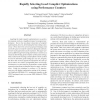Free Online Productivity Tools
i2Speak
i2Symbol
i2OCR
iTex2Img
iWeb2Print
iWeb2Shot
i2Type
iPdf2Split
iPdf2Merge
i2Bopomofo
i2Arabic
i2Style
i2Image
i2PDF
iLatex2Rtf
Sci2ools
104
Voted
CGO
2007
IEEE
2007
IEEE
Rapidly Selecting Good Compiler Optimizations using Performance Counters
Applying the right compiler optimizations to a particular program can have a significant impact on program performance. Due to the non-linear interaction of compiler optimizations, however, determining the best setting is nontrivial. There have been several proposed techniques that search the space of compiler options to find good solutions; however such approaches can be expensive. This paper proposes a different approach using performance counters as a means of determining good compiler optimization settings. This is achieved by learning a model off-line which can then be used to determine good settings for any new program. We show that such an approach outperforms the state-ofthe-art and is two orders of magnitude faster on average. Furthermore, we show that our performance counter-based approach outperforms techniques based on static code features. Using our technique we achieve a 17% improvement over the highest optimization setting of the commercial PathScale EKOPath 2.3.1 opt...
Approach Outperforms | CGO 2007 | Compiler Optimization | Right Compiler Optimizations | Software Engineering |
Related Content
| Added | 02 Jun 2010 |
| Updated | 02 Jun 2010 |
| Type | Conference |
| Year | 2007 |
| Where | CGO |
| Authors | John Cavazos, Grigori Fursin, Felix V. Agakov, Edwin V. Bonilla, Michael F. P. O'Boyle, Olivier Temam |
Comments (0)

